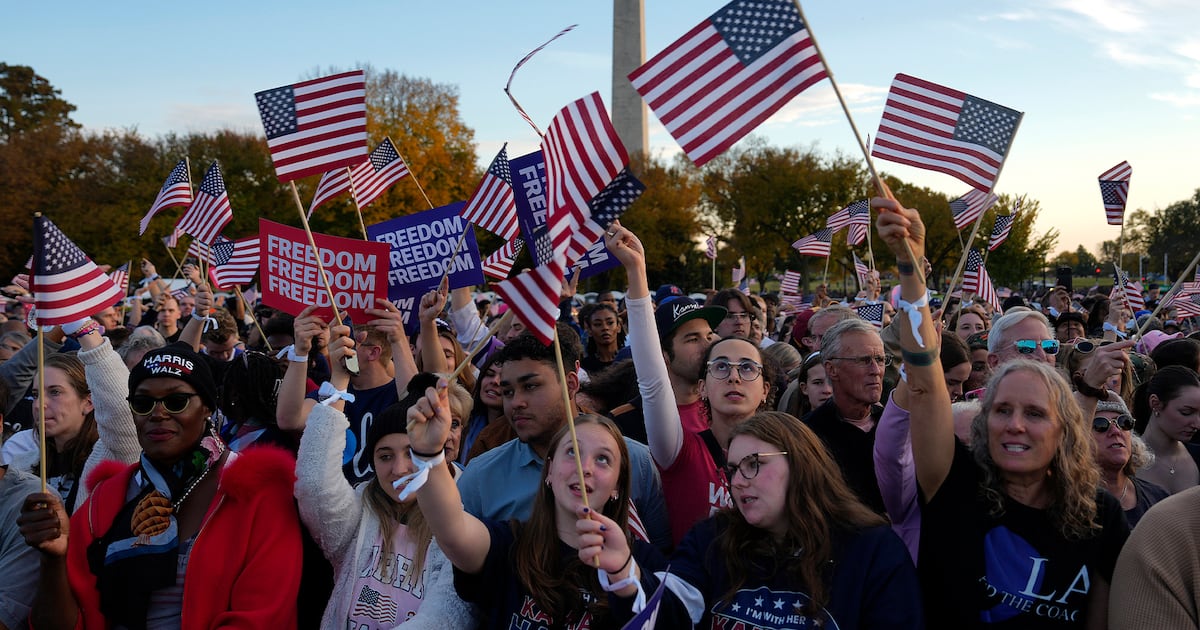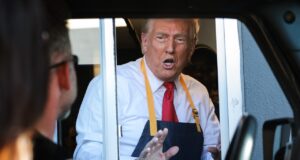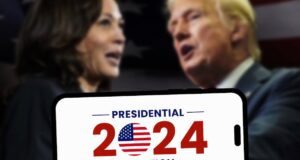
Fashion has tread carefully with the US presidential election. Few brands have made an endorsement, let alone incorporated politics into their marketing. Where they have engaged, it’s typically been along the lines of “vote” campaigns or exhortations to make a positive impact, presumably by supporting Harris, though the candidate herself is rarely named. Willy Chavarria, with his nods to migrant workers and collaboration with the American Civil Liberties Union, is a prominent exception. Anna Wintour is also a longtime Democratic fundraiser, in August hosting an event for Harris alongside Tory Burch. LVMH maintains ties to both camps; Bernard Arnault and his wife, as well as daughter Delphine Arnault (shortly before her appointment as Dior CEO), attended a Biden-hosted state dinner in December 2022 at the White House, while his son, Tiffany executive Alexandre Arnault, visited Mar-a-Lago last year.
Businesses don’t want to alienate customers, and there’s been a general retreat from strident social stances as the energy from 2020 dissipates. There’s also the possibility of a second Donald Trump presidency to consider. Trump has made rewarding his supporters, and punishing his enemies, a staple of his campaign rhetoric. Avoiding politics altogether, or at least the appearance of being stridently partisan, has always been seen in many boardrooms as the low-risk option, now more so than ever (that doesn’t mean they stay neutral; large fashion retailers lobby politician directly and through industry groups on a number of issues).
But even as retailers avoid outward displays of partisan politics, they’re working overtime behind the scenes to prepare for the next administration. And not just in the US. Though it’s Americans voting, their choice will have a profound impact on the global fashion industry.
The extent to which Harris’ playbook will affect fashion is fairly straightforward, as the candidate is expected to stick to the general contours of President Joe Biden’s policies, with one exception flagged below. Trump is another matter entirely.
At the top of the list is Trump’s promise to slap tariffs on a staggering range of imported goods, which will instantly change the economics of where and how apparel is manufactured. The US imports the vast majority of its apparel, accessories and footwear, and lacks the capacity to manufacture significant volumes domestically. In a recent Washington Post interview, the CEO of Columbia Sportswear didn’t mince words: “we’re just going to deal with it and we’ll just raise the prices.” Expect many other brands to do the same should Trump follow through on his campaign promises. Given that consumers are already pushing back on the last round of hikes tied to inflation, adding the cost of tariffs without losing significant sales won’t be easy.
One counterweight would be an extension of tax cuts the Trump administration passed in its first term, as well as a long list of tax breaks Trump has promised on the campaign trail. If passed — a big if, given most of these measures would likely require at least some Democratic support — they would theoretically put more money in consumers’ pockets to pay for their suddenly more expensive imported goods.
Climate policy would also take a major detour, with the Trump administration almost certain to quickly undo much of its predecessors’ work to promote renewable energy and curb emissions. Fashion hasn’t exactly been leading the charge on these fronts. Other governments, particularly in Europe, will continue to apply pressure on the industry to reduce its impact on the planet. But a second Trump presidency would end hope for more ambitious global emissions targets and policies.
The future of fashion dealmaking is more of a wild card, whoever wins. The Federal Trade Commission under commissioner Lina Khan has blocked numerous high-profile mergers, including Tapestry’s proposed acquisition of rival handbag maker Capri earlier this month. Khan, whose three-year term ended in September but will stay on until a replacement is appointed, has fans and detractors in both the Harris and Trump camps. It’s no guarantee that Harris will stick with the FTC’s current track, or that Trump will go back to the anything-goes era.
There are plenty of additional what ifs keeping many people, fashion executives included, up at night. Would Trump really deport tens of millions of undocumented immigrants? How would he handle the escalating conflict in the Middle East? What becomes of Ukraine? Will Trump accept defeat, and if not, what will he and his supporters do? The list goes on and on.
The uncertainty is compounded by the fact that this election is a genuine toss-up. Polls haven’t been so tight this close to a presidential election in a generation, if ever. That means we likely won’t know who won Tuesday night, or possibly even this week. And the ramifications of that outcome will take even longer to unfold.
Editor’s Note: This article was corrected on 4 Nov 2024. An earlier version misstated the date of President Joe Biden’s state dinner. It was held in December 2022. The article was also updated to include Delphine Arnault’s attendance at the event.
The Week Ahead wants to hear from you! Send tips, suggestions, complaints and compliments to [email protected].




